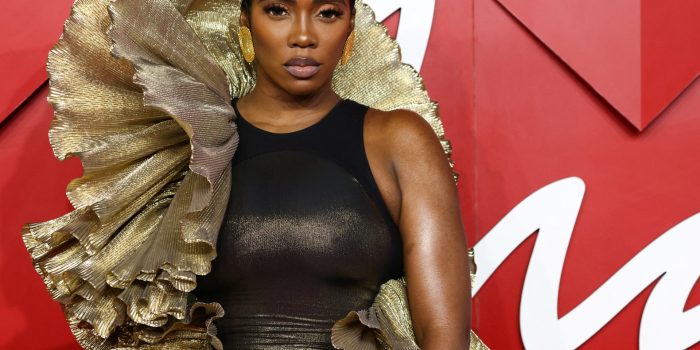Boro Town, Nigeria — When Abisoye Raji saw an Instagram post that Nigerian singer Tiwa Savage would be performing at the coronation of Prince Charles at Westminster Abbey on May 6, she could not contain her excitement.
“Mad oh!” the 23-year-old operations manager at a Lagos-based startup screamed a Nigerian exclamation of surprise as she read from her phone at a public event. Onlookers nearby looked at her curiously, but she kept grinning.
“I was very happy for her because being invited to perform at the coronation of one of the most important monarchies in the world is huge,” she told Al Jazeera, smiling. “It is actually good to see Nigerians winning from top-bottom.”
Afrobeats superstar Savage will join Katy Perry, Lionel Richie and other artists, including South African opera singer Pretty Yende, to perform at the coronation ceremony this Saturday of Britain’s King Charles III, who ascended the throne eight months ago following the death of Queen Elizabeth II.
The ceremony’s officiating will be done by the archbishop of Canterbury, the most senior cleric of the Church of England.
In Nigeria, which got independence from British colonial administration in October 1960, that news has been greeted with mixed reactions.
A colonial legacy
Savage, 43, a Grammy-nominated singer and songwriter who also holds British citizenship, was at Buckingham Palace in March for an International Women’s Day reception held by Queen Consort Camilla.
Back in Nigeria, some of Savage’s compatriots like Raji believe her performance this weekend is a progressive spotlight for Afrobeats, arguably Nigeria’s biggest export since Nollywood films.
But not everyone agrees.
Others have taken to social media to register disappointment with the singer, calling her hypocritical given Britain’s colonial legacy in Nigeria.
Sophia Bambino, a fashion curator, is one of them. For the 23-year-old, it is absurd that any citizen aware of the effects of the colonial history between Britain and Nigeria would accept to perform at the coronation ceremony.
“I don’t know what it is but Nigerians never seem to never want to break out of getting involved with people who colonised and oppressed them for years,” she said. “Let’s also not forget how British colonisation exploited the religion and ethnic identity of Nigerians that led them to abandon some customs and culture.”
Can Savage ‘salvage their image’?
Rolling Stone magazine has reported that multiple artists — including Adele, Ed Sheeran, Harry Styles and Robbie Williams — turned down invitations to play at the coronation.
And for some Nigerians, Savage should have followed suit.
“It’s very embarrassing … that the Crown wants to use an African woman artiste who isn’t their first or second pick to salvage their image somehow,” Lagos-based writer Innocent Chizaram tweeted.
This is actually very embarassing. https://t.co/rn6jDnG4ao
— The Yassification of Chinua Achebe (@Ethereal_ilo) May 1, 2023
Experts say Nigeria’s long history of political, economic and cultural exchange makes it impossible for a full disconnect.
“The Nigerian diaspora in the UK is one of the largest in the world and is a major part of cosmopolitan British as well as Nigerian culture,” said Ikemesit Effiong, head of research at Lagos-based geopolitical risk advisory firm SBM Intelligence. “For better or worse and despite the complexity of Anglo-Nigerian history, the ties that bind both countries remain considerable and will be so for the foreseeable future.”
For Oladokun Peter, a Lagos-based juju musician, even though fans may have their opinion, it should not stop the artist from making decisions they are comfortable with.
“Even people who are elected to defend our nationalism and sovereignty fail to do so,” he told Al Jazeera. “So why stop the artist from making some money because other artists refused to do it?”
Music as a service
Joey Akan, publisher of the Nigerian music newsletter Afrobeats Intelligence, said the performance was simply an artist providing a service like other service providers.
“We somehow feel that musicians offer a social good and not a business commercial product like cooking or anything else,” he told Al Jazeera. “If Tiwa Savage ran a restaurant and King Charles decides to go and eat there for his coronation after-party, will you tell her to chase him out of the restaurant?”
If colonial history truly mattered, he said, Nigerians would not pay huge amounts to the United Kingdom government to relocate or study there.
For others, Nigeria’s present cultural and soft-power standing is enough to begin a new relationship with the UK to showcase African talent on Western platforms, sending the message that the continent can hold its own in the pantheon of emerging global culture.
“If the UK recognises that by inviting Nigerian creatives, we should oblige by using those opportunities to make definitive statements of who we are, what our history is and what we represent in the modern age,” Effiong said.
Meanwhile, Raji is unable to wrap her head around the reasons why Tiwa Savage should have declined to perform — like other artists.
“She is a global artist and if they should invite her, why can she do it? What has this got to do with colonisation?” she asked.
Sumber: www.aljazeera.com

